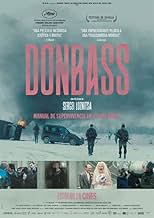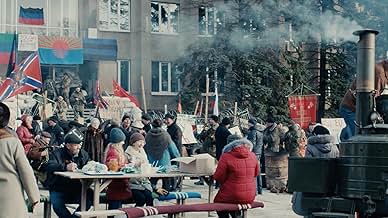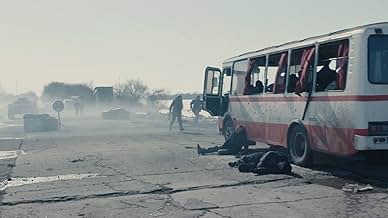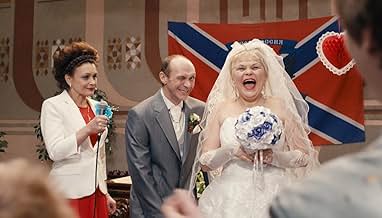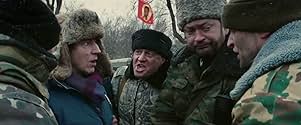Donbass
- 2018
- 2 h 2 min
AVALIAÇÃO DA IMDb
6,6/10
5,1 mil
SUA AVALIAÇÃO
No leste da Ucrânia, a sociedade começa a se degradar à medida que os efeitos da propaganda e da manipulação começam a surgir.No leste da Ucrânia, a sociedade começa a se degradar à medida que os efeitos da propaganda e da manipulação começam a surgir.No leste da Ucrânia, a sociedade começa a se degradar à medida que os efeitos da propaganda e da manipulação começam a surgir.
- Direção
- Roteirista
- Artistas
- Prêmios
- 9 vitórias e 14 indicações no total
Olesya Zhurakivska
- Girl with bucket
- (as Olesya Zhurakovskaya)
Avaliações em destaque
This film was made four years ago, but the war in Ukraine has given it a new urgency. At the time of its original release, the conflict in eastern Ukraine was not high on the world's priority list. Because of the Russian agression, this film has been released again. A good thing, because not only the current affairs are a reason to go see this movie. It is a very good film in its own right.
It consists of short vignettes, loosely related, some surreal, some very shocking, and some even funny. The central theme in each of them is the absurdity of the situation in the Donbass region. I write situation, because what the film shows is not an outright war. Corruption, abuse of power and lawlessness are as much a problem as violence.
Sometimes the scenes are reminiscent of the films by Roy Andersson, the Swedish master of minimalist absurdism. But there are also Fellini-like situations, with over-the-top characters contrasting the bleak reality of every day life in an occupied territory. Apart from the originality, two other things really stand out: the acting and the cinematography. Some of the scenes look like mini-documentaries, not at all like scripted movie scenes. Romanian cinematographer Oleg Mutu shows how effective very long takes can be, sometimes with a camera on the shoulder, sometimes without any camera movement. The very last scene consists of one single, extended shot. It is a master class in understated film making.
It consists of short vignettes, loosely related, some surreal, some very shocking, and some even funny. The central theme in each of them is the absurdity of the situation in the Donbass region. I write situation, because what the film shows is not an outright war. Corruption, abuse of power and lawlessness are as much a problem as violence.
Sometimes the scenes are reminiscent of the films by Roy Andersson, the Swedish master of minimalist absurdism. But there are also Fellini-like situations, with over-the-top characters contrasting the bleak reality of every day life in an occupied territory. Apart from the originality, two other things really stand out: the acting and the cinematography. Some of the scenes look like mini-documentaries, not at all like scripted movie scenes. Romanian cinematographer Oleg Mutu shows how effective very long takes can be, sometimes with a camera on the shoulder, sometimes without any camera movement. The very last scene consists of one single, extended shot. It is a master class in understated film making.
A mix of Kusturica and Fellini, describing the East Ukraine in dark, cold, ironic, cruel, carnaval - like colors. A film about cynismus, propaganda, manipulation, terror, nationalism, cruelty and apparences but, more important, about people as victima of whole situation. Maybe, a manifesto.
I was stunned for most of this. I knew about a plane being shot down and Crimea being taken by the Russians and that there was some sort of ongoing conflict but I was not prepared for this. Described somewhere as a black comedy but I didn't find myself even smiling. There may be a ridiculous element to the Kafkaesque madness depicted here but it is no laughing matter. I note that the director is mainly known for documentaries and this certainly plays like one as we are thrust amidst the craziness as good is described as bad, theft as a donation and killing and maiming for fun as loyalty and an expression of love for the motherland, or fatherland or whatever horrible nastiness underlies these crimes. I think I maybe gained a little more awareness of what might be going on as Russians and Ukrainians and Ukrainians who speak Russian and perhaps prefer Russia to Ukraine prefer to play war games than live their life. This may not have particularly clarified everything for me but I was immensely impressed by the way the film had been made and constructed and how a busy, even chaotic scene one minute could lead to a prolonged and static shot the next, leaving to ponder just what was happening and for goodness sake why!
In an era of fake news and alternative facts, when the public's familiarity with far-flung military engagements derives as much from civilian smartphones as on-the-front-line news reports, and where mass falsehoods promulgate like wildfire via questionable sources on social media, control of propaganda has become a key component of modern warfare. Focusing on the conflict in eastern Ukraine between Ukrainian loyalists and Russian-backed separatists, writer/director Sergey Loznitsa adopts a savagely satirical and unapologetically ironic tone as he examines the corrosive effects hateful propaganda can have at all levels of society. The film presents the Donbass region as a pseudo-Orwellian dystopia of endemic corruption, state-sanctioned discrimination, sycophantic bureaucracy, and unashamed media manipulation. There are no heroes here, because everyone is tainted. The lack of a standard plot and the absence of a protagonist won't be to everyone's liking, whilst the dearth of any geo-political contextualisation will alienate others. Nevertheless, this is sobering stuff, and as timely as it is despairing.
Donbass is made up of thirteen segments, each of which plays out in its entirety before we move onto the next. Relatively self-contained, the only real connection between segments is that each leads to the next via a particular character, who hands the narrative over to someone else (like a baton in a relay race). So, for example, a segment depicting a hospital administrator is followed by a segment in which that administrator is stopped at a checkpoint, where a foreign journalist is being questioned about his passport, and whom we follow into the next segment. And so on. No character, however, appears in more than two segments. Each segment is based on a documented real-life incident that took place in the Donetsk People's Republic (a pro-Russian proto-state in the Donbass) in 2014-2015, with several derived from amateur footage posted on YouTube. Scenes include a woman (Olesya Zhurakivska) dumping a bucket of faeces over a politician (Grigory Masliuk), claiming he libelled her; Mikhalych (Boris Kamorzin), a maternity hospital administrator, proudly showing his unenthusiastic staff that the hospital is fully stocked; a German journalist (Thorsten Merten) being interrogated at a roadblock; Semyon (Aleksandr Zamuraev) learning that his stolen jeep has been recovered by the military; a captured soldier (Valeriy Antonyuk) is accused of being part of a Ukrainian "extermination squad", and is tied to a pole, ridiculed, and eventually beaten by a civilian mob; and a wedding.
Having covered the origins of the War in Donbass in documentary form in Maidan (2014), Loznitsa is not especially interested in context, partly because his point is that no amount of context can explain the absurdity of what is happening. Essentially, however, the background to the film is that after pro-Russian President Viktor Yanukovych was overthrown in November 2013, a series of anti-Revolutionary protests took place across east and south Ukraine, particularly in the Donbass region. These protests soon escalated into open conflict between the Russian-funded, and often Russian staffed, separatist forces, and loyalist Ukrainian forces.
Obviously drawing inspiration from Elem Klimov's masterful Vá e Veja (1985), one of the greatest anti-war movies ever made, Loznitsa is a formalist in the best sense of the term, and working with legendary cinematographer Oleg Mutu, he shoots Donbass in the style of cinéma vérité, hand-held and as unmediated as possible, shunning the presentation of any one person's subjective perspective. Most of the segments are shot in single-takes, which has the effect of heightening tension to almost unbearable degrees, knowing that at any moment, a bomb blast could wipe out the cast or an idiot with a gun and a grudge could open fire. In this sense, Loznitsa brilliantly evokes the unpredictability of war in a manner rarely seen in films with ten times the budget.
The opening segment sets the satirical tone brilliantly. Watching a group of people having makeup applied, we think we are on a film or TV set, but in actual fact, these people are being made up to appear in a "factual" news report as shell-shocked locals, complete with a director telling them what to say, and a stage-managed warzone in the background. It's the very definition of fake news and immediately recalls Barry Levinson's superb Mera Coincidência (1997), in which a White House spin-doctor hires a Hollywood producer to "produce" a fake war so as to distract from a presidential sex scandal.
The film's dark comedy reaches its zenith in the scene where Semyon heads to a military barracks because he's been told the separatist forces have recovered his stolen jeep. Believing that he will be getting the jeep back, he instead discovers that the military want him to sign the car over to them. When he refuses, he's hit with an exorbitant fine. Marched into another room, he finds that room full of men, all on their phones trying to raise funds to pay the fines with which they too have been hit. It's like something out of Douglas Adams - a room full of suit-wearing middle-class men all desperately trying to do the exact same thing.
Thematically, each segment in Donbass has its own target, whether it be a self-serving hospital administrator, a soldier abusing the power he has over civilians, or an uninformed mob interested only in blaming someone (anyone) for their misfortunes. No one escapes censure because no one is wholly innocent. The scene with the soldier tied to the pole is especially difficult to watch. Tied up by separatist forces who encourage passing civilians to verbally abuse him, things soon escalate to spitting and throwing food, and, ultimately, to brutal physical assault. When some of the thugs responsible attend a wedding in the following segment, they amuse themselves and the guests by showing smartphone footage of the man being beaten, whilst the bride declares that she hopes her son is born "with a rifle in his arms".
With a lack of any heroes, or even a protagonist with whom we can identify, the one tone that links the various segments is bitterness; a bitterness deeply ingrained in the souls of the people, who believe the lies they are being fed, with virtually every conversation returning in some way to issues of partisanship. One of the questions Loznitsa is asking is how one can broach reconciliation between people whose enmities run so deep. Positing that the war is being fought as much with lies and propaganda as it is with weapons, he is suggesting that the separatist forces are criminals as much as they are combatants, and he depicts them as inherently unscrupulous, unconcerned with Ukraine or its people, even as they position themselves as the country's saviours.
In terms of problems, although Loznitsa does depict loyalist forces here and there, most of his invective is aimed at the separatists, and in this sense, the film could be accused of being unbalanced. Another issue is the lack of any political contextualisation, with no explanation of who is fighting, nor what they are fighting for, as combatants are introduced without any kind of identification. I understand what Loznitsa is trying to do here - political context is irrelevant in a conflict built on lies and absurdity - but some kind of concession to an audience not familiar with the politics would have been immensely helpful. Another issue is that because there is no central character, there is no real emotional connection. We certainly feel sympathy with some, but there is never any real pathos.
A searing satirical portrait of a place where human interaction has devolved to a level just above barbarism, in the post-truth politics of Donbass, horror, violence, abuse of power, Orwellian propagation (and acceptance) of fake news, and war hysteria masquerading as patriotism are the order of the day. Loznitsa doesn't see the conflict as a legitimate civil war, but instead gang warfare, with the concept of civil war used to cover-up and legitimatise criminality. In the Donbass of the film, reality is a commodity, and its only value is in whether or not it can be sold to the masses. Of course, this situation isn't unique to Ukraine - this simulacrum of a functioning society is replicated all over the world, including the United States, where governmental deception and presidential falsehoods haven't reached the level of Donbass, but are certainly moving in that direction. And for people who still value concepts such as truth, honour, and inclusiveness, this is a worrying trend. Because when truth can no longer be used as a weapon, it must be replaced with something far more powerful and far more dangerous - lies.
Donbass is made up of thirteen segments, each of which plays out in its entirety before we move onto the next. Relatively self-contained, the only real connection between segments is that each leads to the next via a particular character, who hands the narrative over to someone else (like a baton in a relay race). So, for example, a segment depicting a hospital administrator is followed by a segment in which that administrator is stopped at a checkpoint, where a foreign journalist is being questioned about his passport, and whom we follow into the next segment. And so on. No character, however, appears in more than two segments. Each segment is based on a documented real-life incident that took place in the Donetsk People's Republic (a pro-Russian proto-state in the Donbass) in 2014-2015, with several derived from amateur footage posted on YouTube. Scenes include a woman (Olesya Zhurakivska) dumping a bucket of faeces over a politician (Grigory Masliuk), claiming he libelled her; Mikhalych (Boris Kamorzin), a maternity hospital administrator, proudly showing his unenthusiastic staff that the hospital is fully stocked; a German journalist (Thorsten Merten) being interrogated at a roadblock; Semyon (Aleksandr Zamuraev) learning that his stolen jeep has been recovered by the military; a captured soldier (Valeriy Antonyuk) is accused of being part of a Ukrainian "extermination squad", and is tied to a pole, ridiculed, and eventually beaten by a civilian mob; and a wedding.
Having covered the origins of the War in Donbass in documentary form in Maidan (2014), Loznitsa is not especially interested in context, partly because his point is that no amount of context can explain the absurdity of what is happening. Essentially, however, the background to the film is that after pro-Russian President Viktor Yanukovych was overthrown in November 2013, a series of anti-Revolutionary protests took place across east and south Ukraine, particularly in the Donbass region. These protests soon escalated into open conflict between the Russian-funded, and often Russian staffed, separatist forces, and loyalist Ukrainian forces.
Obviously drawing inspiration from Elem Klimov's masterful Vá e Veja (1985), one of the greatest anti-war movies ever made, Loznitsa is a formalist in the best sense of the term, and working with legendary cinematographer Oleg Mutu, he shoots Donbass in the style of cinéma vérité, hand-held and as unmediated as possible, shunning the presentation of any one person's subjective perspective. Most of the segments are shot in single-takes, which has the effect of heightening tension to almost unbearable degrees, knowing that at any moment, a bomb blast could wipe out the cast or an idiot with a gun and a grudge could open fire. In this sense, Loznitsa brilliantly evokes the unpredictability of war in a manner rarely seen in films with ten times the budget.
The opening segment sets the satirical tone brilliantly. Watching a group of people having makeup applied, we think we are on a film or TV set, but in actual fact, these people are being made up to appear in a "factual" news report as shell-shocked locals, complete with a director telling them what to say, and a stage-managed warzone in the background. It's the very definition of fake news and immediately recalls Barry Levinson's superb Mera Coincidência (1997), in which a White House spin-doctor hires a Hollywood producer to "produce" a fake war so as to distract from a presidential sex scandal.
The film's dark comedy reaches its zenith in the scene where Semyon heads to a military barracks because he's been told the separatist forces have recovered his stolen jeep. Believing that he will be getting the jeep back, he instead discovers that the military want him to sign the car over to them. When he refuses, he's hit with an exorbitant fine. Marched into another room, he finds that room full of men, all on their phones trying to raise funds to pay the fines with which they too have been hit. It's like something out of Douglas Adams - a room full of suit-wearing middle-class men all desperately trying to do the exact same thing.
Thematically, each segment in Donbass has its own target, whether it be a self-serving hospital administrator, a soldier abusing the power he has over civilians, or an uninformed mob interested only in blaming someone (anyone) for their misfortunes. No one escapes censure because no one is wholly innocent. The scene with the soldier tied to the pole is especially difficult to watch. Tied up by separatist forces who encourage passing civilians to verbally abuse him, things soon escalate to spitting and throwing food, and, ultimately, to brutal physical assault. When some of the thugs responsible attend a wedding in the following segment, they amuse themselves and the guests by showing smartphone footage of the man being beaten, whilst the bride declares that she hopes her son is born "with a rifle in his arms".
With a lack of any heroes, or even a protagonist with whom we can identify, the one tone that links the various segments is bitterness; a bitterness deeply ingrained in the souls of the people, who believe the lies they are being fed, with virtually every conversation returning in some way to issues of partisanship. One of the questions Loznitsa is asking is how one can broach reconciliation between people whose enmities run so deep. Positing that the war is being fought as much with lies and propaganda as it is with weapons, he is suggesting that the separatist forces are criminals as much as they are combatants, and he depicts them as inherently unscrupulous, unconcerned with Ukraine or its people, even as they position themselves as the country's saviours.
In terms of problems, although Loznitsa does depict loyalist forces here and there, most of his invective is aimed at the separatists, and in this sense, the film could be accused of being unbalanced. Another issue is the lack of any political contextualisation, with no explanation of who is fighting, nor what they are fighting for, as combatants are introduced without any kind of identification. I understand what Loznitsa is trying to do here - political context is irrelevant in a conflict built on lies and absurdity - but some kind of concession to an audience not familiar with the politics would have been immensely helpful. Another issue is that because there is no central character, there is no real emotional connection. We certainly feel sympathy with some, but there is never any real pathos.
A searing satirical portrait of a place where human interaction has devolved to a level just above barbarism, in the post-truth politics of Donbass, horror, violence, abuse of power, Orwellian propagation (and acceptance) of fake news, and war hysteria masquerading as patriotism are the order of the day. Loznitsa doesn't see the conflict as a legitimate civil war, but instead gang warfare, with the concept of civil war used to cover-up and legitimatise criminality. In the Donbass of the film, reality is a commodity, and its only value is in whether or not it can be sold to the masses. Of course, this situation isn't unique to Ukraine - this simulacrum of a functioning society is replicated all over the world, including the United States, where governmental deception and presidential falsehoods haven't reached the level of Donbass, but are certainly moving in that direction. And for people who still value concepts such as truth, honour, and inclusiveness, this is a worrying trend. Because when truth can no longer be used as a weapon, it must be replaced with something far more powerful and far more dangerous - lies.
It's a true glimpse into how modern war is being waged on Ukrainian soil. These are prime examples of how media and false news are being used to spread propaganda. What's not new is what war truly does to people. How it changes them. How humans desperately try to adapt to a desperate situation.
The movie is very accurate and chosen to show only one side of the Donbass are on purpose (you can't squeeze all into one movie). It SHOULD raise questions about "how come I've never heard of this.?" in your mind. Maybe media in the west has deliberately chosen to neglect this particular issue. Why?
All western countries bordering to Russia, however, follow events in Ukraine- and can varify the autenticity of this movie.
To Ukranians- make sure you have a friend next to you to have a drink with afterwards.. you'll likely need it.
Você sabia?
- CuriosidadesOfficial submission of Ukraine for the 'Best Foreign Language Film' category of the 91st Academy Awards in 2019.
- ConexõesReferenced in Radio Dolin: Sergei Loznitsa (2022)
- Trilhas sonorasThe National Anthem of Ukraine
Lyrics by Pavlo Chubynsky
Music by Mikhailo Verbytsky
Performed by The Veryovka National Academic Ukrainian Folk Choir
Principais escolhas
Faça login para avaliar e ver a lista de recomendações personalizadas
- How long is Donbass?Fornecido pela Alexa
Detalhes
- Data de lançamento
- Países de origem
- Central de atendimento oficial
- Idiomas
- Também conhecido como
- Донбас
- Locações de filme
- Empresas de produção
- Consulte mais créditos da empresa na IMDbPro
Bilheteria
- Faturamento bruto mundial
- US$ 141.067
- Tempo de duração
- 2 h 2 min(122 min)
- Cor
- Proporção
- 2.35 : 1
Contribua para esta página
Sugerir uma alteração ou adicionar conteúdo ausente

![Assistir a Trailer [OV]](https://m.media-amazon.com/images/M/MV5BZDBjMTdhZDYtOWI4NS00NmYwLWExYjgtY2VmYzQxYzlkNDhmXkEyXkFqcGdeQXRyYW5zY29kZS13b3JrZmxvdw@@._V1_QL75_UX500_CR0)


